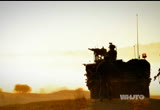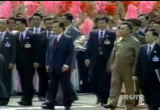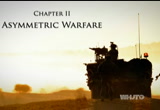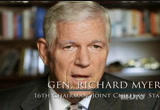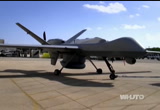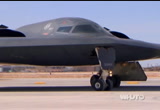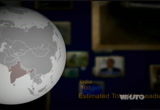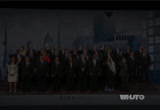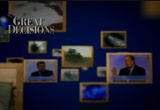tv Great Decisions in Foreign Policy WHUT December 31, 2012 8:30am-9:00am EST
quote
8:30 am
>> the defense department has one job: keep americans safe. but with its budget on the fiscal chopping block, the decision of what to cut is a matter of life and death. (gunfire) >> they put the total u.s. spending for defense at $699 billion. >> we can reduce that by well over a $100 billion
8:31 am
>> foreign policy is actually not foreign. >> america has faced great hardship before and each time we have risen to the challenge. >> the ultimate test is to move our society from where it is to where it has never
8:32 am
the last century fighting well-defined wars against well-heeled enemies. ♪ stop! >> duck and cover up under the table. first you duck and then you cover. >> but the fall of the berlin wall meant the collapse of the traditional enemy and the military struggled to find its purpose in this post soviet world. >> we have to understand the role that the united states has played since the end of the second world war and still plays today and that is as a provider of security. not only to itself but to lots of nations around the world. and i think that the general global stability that we've enjoyed since the second world war is largely due to america's ability to play that role and that's what the defense budget pays for. (slow instrumental music) >> but the attacks of september 11, 2001 gave rise to a new enemy, islamic terrorism. and military leaders struggled over how to even find this foe, much less fight it.
8:33 am
>> all of a sudden these various groups got swept up together in a larger war on terror. and since 9/11 over the past decade we've spent billions of dollars in pursuit of a very difficult goal which is eradicating these small groups that seek to create overreactions on the part of governments. >> one of the reasons we're in so much trouble in afghanistan is because we went well beyond our mission. we accomplished the mission, but we took our eye off the ball when we intervened, invaded iraq and occupied iraq. and now twelve years later we're not sure what our mission is. >> the iraq war cost more than the war in vietnam, for example, and we spend trillions of dollars once all the, the needs of veterans and service members, over two million who were deployed to iraq and afghanistan since 9/11, are met in perpetuity and their families. and so, so it's an incredibly costly thing. >> and a major milestone for the u.s. effort
8:34 am
in afghanistan, the war is now entering its twelfth year, making it the longest running war in our nation's history. >> now as the wars in iraq and afghanistan come to a close, a frail economic climate at home has left many americans wanting to keep the troops home for good. >> the pentagon came out with new defense guidance in january 2012, which reflected the obama administration's understanding that budgets were going to be constrained first. and that second, the united states would not be likely to fight anymore wars like iraq or afghanistan in the near future, or the next decade or so. >> the point is that the american appetite for global intervention is going to decrease. there aren't many americans that want to keep going in afghanistan after 2014. there aren't many americans that are gonna want to go into iraq even given its importance in terms of global energy and oil. >> i think that reflects an understanding of where the country is. the u.s. whatever you think
8:35 am
about how long troops should remain in afghanistan. i think everybody thinks that's enough with that kind of commitment of u.s. forces overseas. >> is our mission to eliminate taliban? it never was our mission. it is nation building? is it sending children to school? is it building sewer systems? is it going after al-qaeda? so, all those factors are complicated but they have to be carefully thought through and i'm not sure we've done that very well in the last ten years, but i do think we will do it smarter. we always learn. they're tough lessons to learn. vietnam was a tough lesson for us to learn. (instrumental music) >> but even as the war on terrorism winds down, the nuclear threat is surfacing once again. >> iran is working on a longer-range missile capability, an intermediate range missile, that could reach europe. and these guys are good. eventually they will develop an icbm that could reach the united states.
8:36 am
>> the iranians are being continuing to amass technologies, learning how to enrich uranium, stockpiling low enriched uranium and it's getting to a level in which particularly one of iran's major rivals in the region, israel, is sounding the alarm bells and saying that the iranians are getting too close. >> graeme lawson, a great historian of the cuban missile crisis said that the iran nuclear issue is the cuban missile crisis in slow motion. (instrumental music) >> and north korea continues to make itself heard, regularly testing nuclear missiles despite international condemnation. >> it's estimated that the next time north korea tests a nuclear weapon it could be by highly enriched uranium, whereas the last two were believed to be through the plutonium route. so this is very problematic, not just because north korea having lots of fissile material is a bad thing, but north korea has a tradition of selling off anything that can garner hard currency on the open market. >> and though the soviet empire is a thing of the past, china is echoing
8:37 am
the aspirations of its predecessor. >> there's no question that we're going to face a very serious challenge in the years to come, dealing with a rising china that wants to be dominant and hegemonic in its own region, wants to control sea lines of communication, wants to control the south china sea. and we have allies who stand to lose from that and look to us for support. i think that's the likeliest area of actual conflict. >> the pentagon will often say and right now the u.s. spends something like 4, 5, 6 times what china spends on its defense spending. and the big question then becomes what is china's intention? (instrumental music) >> in a national call to arms defense secretary leon panetta warned the threat of a significant cyber attack against america is already here. >> the collective result of these kinds of attacks
8:38 am
could be a cyber pearl harbor. >> what are the threats american's face in this century? with the attacks of september 11th, the u.s. has had to completely rethink how it defends its citizens. the enemy no longer a national armies but rather determined individuals. >> there are not going to be a lot of countries that are gonna be stupid enough to put tank armies out in the desert against us anymore to allow us to annihilate them. what the lessons of history of the last twenty years or so certainly teach us is that if you're fight us, you can have greater success by using terrorist tactics, by employing suicide bombers, i.e.d.'s, those kinds of attacks. >> that was probably the biggest impact on national security. we have non-nation state actors that can cause harm to the united states and significant harm. and perhaps have profound effect on the security, even though they're not nations, they don't have armies, navies and air forces.
8:39 am
>> and after a decade of fighting terrorism, the u.s. has adapted. military planners have turned away from major ground wars in favor of more nimble special operations. >> there's an old adage that, "this war is not like the last war, this war is not like the next war, this war is like this war." the point being that they're all different. and the enemy has a brain, the enemy adapts and adjusts to whatever the united states does. >> there's been a tension in the u.s. military which is particularly important today between preparing for the big wars, like wwii or, or the gulf war and preparing for counter-insurgencies against lesser threats, guerilla groups and terrorists. as we had to face whether it was the vietcong in vietnam of al-qaeda in iraq or the taliban. >> i actually think that in
8:40 am
the 21st century large land war is going to become more and more rare. nimble special forces types operations or relatively brief deployments of small numbers of troops will be much more likely. >> special operations forces, which is also the tool like navy seals, which were involved in the killing of bin laden, their size and their budgets have almost tripled since 9/11. (gunfire) >> because of the economic downturn, because of the american public is war weary, we're turning much more to unconventional means, committing special forces and using the cia, using unmanned drones to try and dismantle terrorist organizations in hard to reach places. >> these unmanned drone strikes have shaped the frontline of the current war against al-qaeda and its ilk. >> some of the capabilities that are now being used to a larger degree just didn't exist before 9/11. so famously in the afghanistan
8:41 am
invasion in december 2001, the u.s. had two drones that were flying over afghanistan. one was armed, one was unarmed. today we have 7500 drones. >> the use of drone aircraft, as opposed to thousands of troops on the ground, maybe more effective in eliminating terrorists. >> the last i counted there were approaching fifty countries, that either had or were developing drone attack capabilities. >> but drones have little influence over the latest battlefield of the 21st century, computers. >> certainly the most consistent, persistent and potentially disruptive threat is a cyber attack. potentially dismantling your financial service system, having an impact on utilities, i mean, across the board. >> i think the greater threat to all of us is going to be directly a dagger at the heart of our economic interests
8:42 am
and certainly i would start with the cyber. all the other threats are still going to be there, nuclear proliferation, terrorism, weapons of mass destruction, all the things that we're dealing with today. but in the end, we can deal with those. we can manage those. we can work our way through those. the big issues are things like cyber. that's where we really got to pay attention. >> we haven't yet got to the point with one possible exception and that was the stuxnet operation by israel and the united states against iran, where keys clicked on the keyboard had actually effected physical change. and until we get to that point, cyber will still be a secondary threat. >> and as americans learned in 2001, a weapon of war can be as simple as an envelope filled with a biological agent called anthrax. >> biological weapons can basically be created by someone with a graduate degree and some tools that they've bought at the hardware store. >> we had the fantastic 9/11 commission, which did a very good job
8:43 am
of figuring out how and why we missed the threat of al-qaeda, why the world trade centers collapsed. but we've never really done a serious look at the whole anthrax episode. >> and then there's the most frightening threat of all, a nuclear bomb tucked inside a suitcase. >> that's the ultimate nightmare that some terrorist group will get their hands on a nuclear device and set it off in new york or washington or some other city. (instrumental music) >> the president wants $489 billion in defense cuts over ten years. pentagon officials say the goal is to create a smaller, flexible force that can fight traditional wars and mount special operations. >> now that we know the threats that are out there, where is our money being spent? >> the congressional budget office had an estimate that they put the total
8:44 am
u.s. spending for defense at $699 billion. now, that is 20 percent of all federal spending, that is more than half of all discretionary spending. it's a substantial commitment to the united states. >> we spend less and less of our defense dollars on things that actually defend us. fifty percent of our defense budget goes to personnel. much of that personnel is bureaucratic personnel manning various defense department sites. >> currently much of the money is going to conventional needs, personnel, r and d and nuclear weapons. >> the congress debated the issue of replenishment of our stock or at least making certain it was okay and about $10 billion was mentioned as a figure. i think that's in the ballpark of the amount of money that's likely to be spent in the near future. >> but for the first time since the september 11th attacks, the pentagon
8:45 am
has asked congress for a budget less than the year before. >> the agreement that the obama administration and congress made was to cut six percent of the defense budget. which even it was cut would be well above what was pre-9/11 numbers. >> so we'll be looking at more than a trillion dollars in cuts to our defense budget over the next ten years. where will those cuts be? the much shorter answer is, where won't those cuts be? >> we're talking about $650 billion. we can reduce that by well over $100 billion a year. i believe, frankly by, not in the first year but by a couple of years from now, by $150 billion a year and still be far safer than we've been and without any potential threat to our ability to exist. >> and in the next five years, the military will downsize its active duty personnel and move many of them from europe back to the u.s. in a pivot to asia.
8:46 am
>> the key budget and strategic question, as i look out over next five years or so is, is how does the u.s. remain strong or even add to its strength in asia without simply reinforcing what i think of as the legacy systems that we've had for generations that were our means of projecting power during wwii. >> i think we can withdraw from western europe and the mediterranean. i think we should be clear that we're not going to get involved in any major land wars in asia and we can substantially reduce. >> manpower's expensive. you have to train people, put them around the world, move their families. there i suspect is going to be where some of the cuts are going to come and they'll probably be focused on the army. >> we have already taken men and women out of europe. we will start closing bases. we are limiting the end strength of our uniformed forces. we have stopped acquiring new material. we will have fewer aircraft
8:47 am
carriers at sea than our national security doctrine envisions even in this year. we are, quote, "pivoting our focus to asia," and we are doing so with under-staffed, under-resourced carrier battle groups that will not be able to actually be in the middle east and asia at the same time. we're. we're going to be a different country very soon if we keep disinvesting in the military. >> as aging and ineffective equipment is decommissioned, the military is spending more on surveillance systems, drones, and long-range bombers. >> from a limited standpoint of cost-effectiveness drones are great weapons. they're extremely precise. they kill the people, they're generally speaking, they kill the people that you want to kill and they don't kill the people that you don't want to kill. uh, the missiles themselves are fairly cheap. the air platform, unmanned, is cheap.
8:48 am
this really is a revolution in warfare. it pushes the cost of killing way down, but it also allows you to operate without having your own soldiers on the ground and risk casualties yourself, so you're not spending money, you're not spending lives and you're able to take out your adversaries. >> and the military is increasing its investment in technology. creating programs like the u.s. cyber command, which aims to protect the defense department's networks in case of attack. >> the u.s has more offensive cyber capabilities than anyone else in the world, but it's also very vulnerable to the capabilities it has. and so what are the sort of rules of the road, codes of conduct, that we can try to coordinate with other countries that we'll agree not disrupt these critical infrastructures, not to disrupt these facilities, and what sort of networks we won't exploit for information, and what sort of kinetic, like, offensive attacks we will not take. >> the u.s. had very aggressive
8:49 am
in secret in its attempt to develop cyber warfare, no question about that. so have our adversaries, potential adversaries. so have the chinese, so have the russians, so have the indians. and smart people around the world can use the same tools that the united states can, just look at where software's being developed. >> and the traditional threat of nuclear war is still on the forefront of mind's at the pentagon, even as they investigate options for reducing america's own arsenal. >> president obama's goal that he articulated in 2009 was to secure all the world's fissile material by the end of 2013. hard to say if we'll get there, but it's certainly removed a lot of country's fissile material. >> they're are nuclear weapons in india and pakistan, nuclear weapons in china, as, as well as in russia. so that's quite spread there in that part of the world. the threat always that iran will finally develop a nuclear weapon or more.
8:50 am
that israel probably has nuclear weapons. >> and preparing for all these threats is not cheap. >> much as we may not like it. if we're going to maintain our military edge we're going to have to keep spending an awful lot of money in the future because the nature of the threats we face is so unpredictable and we just have to prepare for a whole range of scenarios. >> when we think about the costs to ourselves of maintain the sea logic communication, maintaining a big navy, maintaining a big force in general, uh, the only really intelligent way to look at this is to think about what are the costs of not doing that? what are the costs if this global order breaks down? i think those costs need to be thought about as well. (instrumental music) >> with all those threats to consider, where are defense dollars best spent in 2013.
8:51 am
for some the answer is clear, asia. >> earlier this month u.s. secretary of state hillary clinton visited china and some asian countries. the obama administration is highlighting its policy shift, which places new emphasis on the asia-pacific region. >> the primary long-term emerging threat which requires a large military, according to some, is china. the chinese understandably are very leery of the u.s. descriptions of its policy, including, including phrases like "pivot to east asia" and "united states has always been a pacific power." um, the u.s. always says that this not about any one country, but if i'm a chinese military leader i would take it to mean china specifically and they do. >> china has a very concerted blue water policy. they believe that they need to dominate the seas. they are, uh, they are extraordinarily worrying to india on the one side, to our other asian allies,
8:52 am
and we have understood the imperative of resourcing a push-back in the pacific. the problem is we haven't understood that we need to spend to do it and we haven't figured out how to spend to do it. >> when i talk to chinese defense analysts and scholars when i visit china they don't talk about these legacy systems. they are happy to let us patrol the sea lanes and do all the traditional great power things that require these big, extremely expensive systems. they want to jump over the world of aircraft carriers and manned bombers to a new era in which the wars will be fought in, in space, with blinding our sensors that are in space, and in cyberspace in this electronic sphere on which we increasingly depend for all of our images, transactions.
8:53 am
this is now the central nervous system of our world and the world as a whole. >> i think our best hope that china develops a nation that is contributing to the goodness in this world is to build relationships with them. i think it's really important to, to try to understand their point of view and, and to work with them. knowing all the time that, in terms of cyber-attacks against the united states a lot of those, most of those, emanate from china and they're going after some of our, our dearest secrets. >> but china is just one of the many threats to american safety. >> this is not a world in which you say this is likely to happen 80% and you prepare for it, this is likely to happen 50% and we'll prepare for it. it's a world in which you say these things could happen and we need to build up our capability to respond very quickly. >> the process of threat assessment is, is more of an art than a science. oftentimes you're dealing, uh, with potential enemies
8:54 am
whose thinking is obscure or whose inner thoughts are unavailable to you and you have to read the tea leaves in trying to divine what their actions might be. >> people want to make a choice, they want to say let's focus on the current problem, less on the future. so other people say let's focus on the future and not so much on the current problem and unfortunately we don't have that option, that's just not with the role the united states plays today. >> ultimately defending the country with less money will mean rethinking what defense really is. >> the old-fashioned establishment of national security still thinks that the world is all about nation-state conflicts. so climate change doesn't rank high, energy scarcity doesn't rank high, resource generally, global health issues. even financial management after 2008 still ranks far below the sort of old-fashioned, you know, country-versus-country
8:55 am
conflict issues. that's changing, but it's changing slowly. >> i think we can move to manage a lot of these big problems. we won't solve them all. some are not solvable right now. um, but i think the best we can do is manage them. move them to the high ground of possible, uh, potential solution, and eventual resolution. that's the kind of world we live in and it isn't gonna get any less complicated. >> while the way we think about national security and the role of our military is changing. one thing is certain. defending america on a budget will require great decisions. >> to join a discussion group in your area or order a dvd of this series, visit greatdecisions.org or call 1-800-477-5836. great decisions is produced by the foreign policy association, inspiring
8:56 am
americans to learn more about the world. sponsorship of great decisions is provided by credit suisse, eni, the hurford foundation, and pricewaterhousecoopers llp. >> next time on great decisions: for 30 years the u.s. and israel have enjoyed stable relations with egypt, but now revolution has rocked the arab nation and the prospect of peace hangs in the balance. power to the people, the new egypt. next time on great decisions. www.captionlink.com
154 Views
IN COLLECTIONS
WHUT (Howard University Television) Television Archive
Television Archive  Television Archive News Search Service
Television Archive News Search Service 
Uploaded by TV Archive on

 Live Music Archive
Live Music Archive Librivox Free Audio
Librivox Free Audio Metropolitan Museum
Metropolitan Museum Cleveland Museum of Art
Cleveland Museum of Art Internet Arcade
Internet Arcade Console Living Room
Console Living Room Books to Borrow
Books to Borrow Open Library
Open Library TV News
TV News Understanding 9/11
Understanding 9/11

